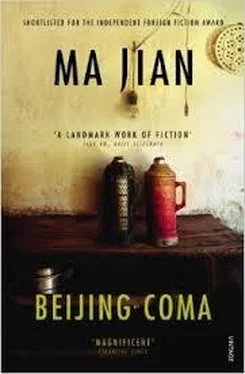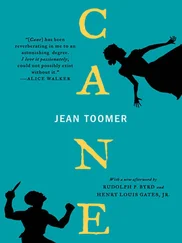Han Dan put his sunglasses back on and shouted through his megaphone, ‘The municipal government forbade Beijing residents to offer us food or money, or to come onto the streets to watch us. It looks like they’ve failed, doesn’t it!’
Wang Fei said, ‘In a speech yesterday, Deng Xiaoping said, “We’re not afraid of public reactions, international opinion, or the shedding of blood!” I think we should use that as our slogan!’ After reading the editorial, he’d stayed up all night writing a fifteen-page letter of protest. It was the longest text that had ever been displayed in the Triangle.
‘That was an internal speech, we don’t have a written copy of it,’ said Yang Tao. His previous leadership of the Democracy Salon prepared him well for his new role as head of the Organising Committee’s political theory office. He was wearing black-rimmed glasses. His neck was long and spindly, his shirt collars were always clean and his hair neatly combed.
‘We’ve inside information that the police won’t arrest us today,’ said Shu Tong, ‘but if this blockade proves impenetrable, it would be best to return to the campus and continue the demonstration there.’ He looked very glum. He hadn’t been in favour of the march. Earlier that morning, he and Liu Gang had spoken with the university authorities, who’d promised that if the students called off the protest, they would act as mediators and persuade the government to establish a dialogue. Shu Tong favoured the deal, but the rest of the Organising Committee rejected it, which left him with no alternative but to join the march. Old Fu, who was now head of logistics, had stayed behind to keep watch over the campus.
‘This blockade is much larger than the one at the Zhongguancun intersection,’ said Hai Feng, looking like a village schoolteacher in his white shirt and beige jumper.
The blockade at Zhongguancun had only been four rows deep. We’d charged through it very easily. The officers had been unarmed, and had retreated to the sides of the road as we approached. Some of them even laughed and waved.
But as we neared this blockade, the police raised their megaphones and bellowed aggressively. We came to a terrified halt. I swallowed the last mouthful of my pork bun, and shouted, ‘Student marshals — hold hands! Don’t give the police an excuse to attack us!’ The megaphone made my voice sound crisp and clear.
‘Keep calm, everyone!’ Zhuzi shouted out from his side. ‘Remember — this is a peaceful march! We’re not breaking the law.’
Wang Fei and I had cajoled many science students into joining the student marshal team. They were now moving to the front of the procession to fend off any police attack.
The New Year’s Day march of 1987 had taught me the importance of maintaining order. If things got out of hand, the police would make arrests and accuse a ‘small band of manipulators’ of creating turmoil. During marches staged in Changsha and Xian the day before, local residents had taken advantage of the commotion to loot shops. Zhuzi and I had already decided that if there was any violence we’d immediately lead the marchers back to the campus.
Bai Ling and Sister Gao were standing at the front. This was the first march Sister Gao had joined. Since she’d committed herself to the movement, she’d worked harder than anyone else. As well as playing an active role in the Beijing Students’ Federation, she’d drawn up new guidelines for the Organising Committee, ruling that Ke Xi shouldn’t be authorised to sanction expenditures of over one hundred yuan, and that all committee members must attend the daily meetings.
The students at the head of the procession began to line up opposite the police blockade.
Ke Xi held up a copy of the People’s Daily and shouted to the police: ‘Comrades! In yesterday’s editorial entitled “We Must Take a Firm Stand Against Turmoil” it says, “A small handful of opportunists bent on fomenting unrest took advantage of the death of Hu Yaobang to deliberately…”’
While he read out the editorial, two students lifted him up onto the rack of a bicycle so that everyone could see him. When he came to the end, he yelled, ‘We must oppose slanderous reporting and let the public hear the truth!’
He then pushed his way over to the police and asked them to let us through. The night before, he’d written out a will, and repeated his vow to fight to the bitter end.
‘Go back to your campuses!’ the head of police shouted. ‘The road is blocked. If you come any closer, we won’t be responsible for the consequences!’ He had white gloves and shiny gold epaulettes. His face was expressionless.
Shu Tong turned to Cao Ming and said, ‘Let’s retreat and try to get to the Square through the back lanes. If we charge, who knows what might happen?’
‘You said the police aren’t going to arrest us, so what are you afraid of?’ Shao Jian said. He’d seldom disagreed with Shu Tong in the past.
Wang Fei waved his index finger. ‘This wouldn’t be the first blockade we’ve charged through. Let’s give it a go. If it doesn’t work, we can turn back.’
Liu Gang said, ‘There are 100,000 students marching with us today. We can’t lead them through the back lanes. It would take us hours to reach the Square. We must press on. All the other universities are in the same situation. The Beijing Normal students have just sent word that the Beitaipingzhuang intersection is blocked too.’
‘The Politics and Law University’s march was blocked at Xinjiekou,’ I said, ‘and they’re trapped in a road to the north.’
‘Let’s get more students to line up opposite the police wall and start shouting slogans,’ Wang Fei said, his cheeks turning red. ‘We’ll show them who’s the strongest.’
‘If we break up the ranks, there could be a stampede, and people will get crushed,’ I said.
‘We’ll never get past that blockade,’ said Chen Di who must have climbed a wall or a lamp post to get a better view. ‘There are two walls of police, each twenty rows deep, and between them, a crowd of old women from local neighbourhood committees. If we breach the first wall, we’ll be squashed in the middle like mince in a pie.’
Han Dan patted a marshal’s shoulder and said, ‘Go and tell the other universities behind us what’s happening.’
The back of our column suddenly began pushing forward, unaware of the blockade. The students crushed at the front ran off onto the pavements. I could hear girls screaming.
The sun shone on the sea of student faces. The eyes of the policemen opposite us were hidden by the shadow of their green caps.
‘Continue the class boycott! Demand a dialogue with the government and a retraction of the 26 April editorial! The people’s police love the people! The police fight official corruption, not patriotic students!’ The waves of chanting voices continued to roll through the air above us and crash against the buildings.
‘The Qinghua students have joined the back of our procession, Han Dan!’ Yang Tao shouted, squeezing his way to the front. ‘There are thousands of them.’
‘Good! We might just make it then. Who’ll lift me up?’
Chen Di and I squeezed over and lifted Han Dan onto our shoulders. He shouted through his megaphone, ‘Fellow Beijing University students! The Qinghua students have come to help us! We’re about to turn a new page in our university’s history. Let’s march forward with our heads held high, for the sake of our motherland, freedom and the Chinese people!’
‘Come on, fucking hell, let’s charge!’ Wang Fei yelled through his cupped hands. Within seconds, two officers appeared in front of him. One told him to step back. The other, who had an official badge on his sleeve, talked into a walkie-talkie, no doubt giving a description of him. Moments later they were both knocked aside by the surging hordes of students. Everyone screamed and yelled in the mad rush. Bai Ling, who’d fallen down and was crawling on her knees, poked her head out between the legs of two policemen. By the time we’d pulled her up, she could hardly breathe.
Читать дальше












